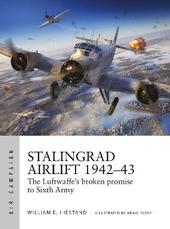
|
Stalingrad Airlift 1942-43: The Luftwaffe's broken promise to Sixth Army
Paperback / softback
Main Details
| Title |
Stalingrad Airlift 1942-43: The Luftwaffe's broken promise to Sixth Army
|
| Authors and Contributors |
By (author) William E. Hiestand
|
|
Illustrated by Adam Tooby
|
| Series | Air Campaign |
|---|
| Physical Properties |
| Format:Paperback / softback | | Pages:96 | | Dimensions(mm): Height 248,Width 184 |
|
| Category/Genre | Second world war |
|---|
| ISBN/Barcode |
9781472854315
|
| Classifications | Dewey:940.5421747 |
|---|
| Audience | |
|---|
| Illustrations |
Illustrated throughout with around 60 photos and at least 14 pages of colour illustrations
|
|
Publishing Details |
| Publisher |
Bloomsbury Publishing PLC
|
| Imprint |
Osprey Publishing
|
| NZ Release Date |
2 May 2023 |
| Publication Country |
United Kingdom
|
Description
The story of what really led to Germany losing the battle of Stalingrad - the inability of the Luftwaffe to keep Sixth Army supplied throughout the winter of 1942-43 - and why this crucial airlift failed. Luftwaffe chief Hermann Goering's failure to deliver his promise to keep Sixth Army supplied at Stalingrad was one of the most hard-hitting strategic air failures of World War II. 300 tons a day of supplies were required to sustain the Sixth Army, flown in against a Soviet fighter force whose capabilities were rapidly being transformed. The Luftwaffe's failure left Sixth Army trapped, vulnerable and too weak to attempt a breakout. The destruction of Sixth Army was one of the major turning points in World War II but the Luftwaffe's crucial role in this disaster has often been overlooked. Some claim the attempt was doomed from the beginning but, in this intriguing book, author William E. Hiestand explains how the Germans had amassed sufficient aircraft to, at least theoretically, provide the supplies needed. Demands of aircraft maintenance, awful weather and, in particular, the Soviet air blockade crippled the airlift operation. In addition, the employment of increasing numbers of modern aircraft by the Soviet Air Force using more flexible tactics, coupled with Chief Marshal Novikov's superior Air Army organisation proved decisive. The Luftwaffe did eventually recover and mounted focused operations for control of limited areas of the Eastern Front, but overall it had lost its dominance. Packed with strategic diagrams and maps, archive photos and artwork of aerial battles over Stalingrad, and including bird's eye views of Operation Winter Storm and airlift operations and tactics, this title clearly demonstrates how the Luftwaffe lost its strategic initiative in the air.
Author Biography
William E. Hiestand has worked for over 30 years as a US Department of Defense analyst, focusing on military issues and serving in a wide variety of analytic, leadership and representational roles. He holds an MA in History from Cornell University, and has a lifelong interest in military history with a particular focus on 20th-century armoured and mechanized operations and Soviet military history. He lives in Virginia near Washington DC.
|